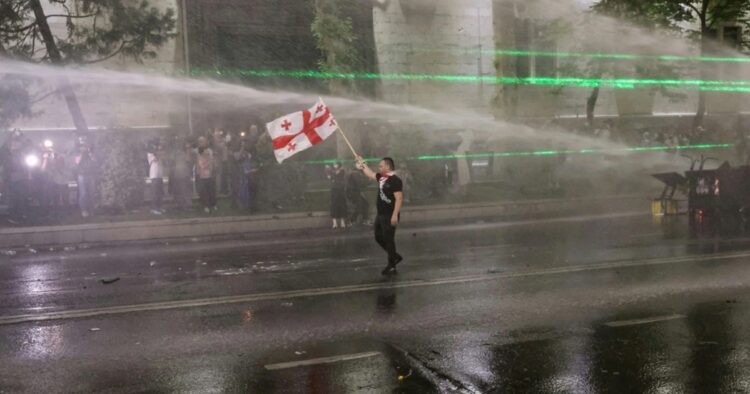In Georgia’s capital, Tbilisi, tensions escalated as police used tear gas and water cannons to disperse protesters gathered outside Parliament.
The demonstrators were rallying against a contentious bill that they argue restricts media freedom. Reports from the Interior Ministry indicate that 63 individuals were arrested during Tuesday’s demonstration.
The protests stem from opposition to a proposed bill that would mandate media and non-commercial organizations to register as “pursuing the interests of a foreign power” if they receive more than 20% of their funding from abroad. Critics of the bill, including protesters, liken it to Russian legislation used to target independent media and dissenting voices critical of the Kremlin.
Opposition MP Levan Khabeishvili, who was among those arrested, posted a photo of himself with visible injuries on social media, alleging police assault. His party members echoed the claim, adding fuel to the controversy surrounding the handling of the protests.
This bill isn’t new; it’s reminiscent of a similar proposal by the ruling Georgian Dream party last year, which was withdrawn following widespread public outcry.
Protesters fear that if enacted, the legislation could tighten state control over the media landscape and jeopardize Georgia’s path towards European integration, particularly after the country was granted candidate status in late 2023.
“We do not want the Soviet regime that our parents have experienced,” remarked Kato Salukvadze, one of the protesters, emphasizing the significance of resisting what they perceive as a step backward towards authoritarianism.
The escalation occurred when protesters attempted to block Parliament entrances, prompting police intervention. Deputy Interior Minister Aleksandre Darakhvelidze accused demonstrators and opposition leaders of instigating violence, alleging that MP Khabeishvili was injured while resisting police orders.
Opposition figures like Giorgi Vashadze condemned the heavy-handed approach of the ruling party and law enforcement, emphasizing the right to peaceful protest and calling their actions “completely illegal.”
Despite ongoing protests, earlier this month, Parliament endorsed the bill on its first reading. Debate is set to continue as part of the bill’s second reading, with three readings required for adoption.
President Salome Zourabichvili has pledged to veto the bill if passed, but the ruling party holds the power to override her decision, potentially leading to its enactment into law through parliamentary channels.

















Comments